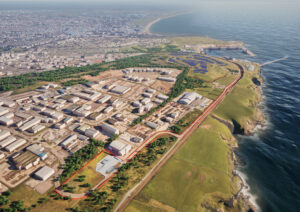How can industry take action to improve air quality?
VIEWPOINT: Brian Worrall, director of corporate affairs for alternative fuels provider Certas Energy outlines future options for cleaning up the UK’s air and reducing vehicle emissions.
As it stands, the UK will not comply with the legal limits set out in the Climate Change Act for air quality until 2025, and not until 2030 in London. In recognition of the need to mobilise the public and industry to take action, National Clean Air Day on 15 June offers the perfect opportunity to work together to clean up air quality in the UK.
The air quality issue has risen to the top of the agenda in recent months, and rightly so. Breathing in high levels of Nitrogen Oxide (NOx) emissions and particulate matter (PM) has been linked to the onset of Alzheimer’s and chronic heart and lung disease making the current quality of our air a pressing threat to public health.
With the lack of a clear plan from the government to improve air quality in the UK, it is time to rethink our approach to tackling this problem. But with the onus on local authorities and fleet owners to upgrade vehicles, invest in new technologies and introduce Clean Air Zones, more needs to be done to offer practical support.
Industry
The construction and haulage industries in particular have found themselves under pressure due to their reliance on diesel-powered machinery and vehicles. We’re all aware of the impact that heavy use of diesel has on the environment, but the reality is that we can’t just switch off our reliance on diesel overnight, especially for businesses whose fleets and machinery rely on it to keep moving.
Instead, at least in the short to medium term, we need to consider solutions that won’t require huge levels of investment or cause activity to grind to a temporary halt. Making smarter fuel choices is a practical and proven way to help improve air quality with immediate effect.
Paraffinic fuels offer a readily available solution to make a positive impact on air quality and local emissions. Since April 2016, paraffinic fuels have been officially recognised under the EN15940 standard. There are three main types of paraffinic fuels: hydrotreated vegetable oil (HVO), gas-to- liquid (GTL) and biomass-to-liquid (BTL). As part of this family of fuels, Shell GTL (Gas-To-Liquid) Fuel has improved combustion properties inside standard diesel engines, helping to reduce emissions of harmful air pollutants, including NOx and PM.
Emissions
Trials have shown that NOx emissions can be reduced by up to 37%, and PM by up to 90% with Shell GTL Fuel compared to conventional diesel. The fuel can be used as a direct replacement for conventional diesel in both heavy and light-duty engines, without the need for investment in infrastructure or modification to existing diesel engines. Furthermore, this alternative fuel has a longer shelf life than conventional diesel and it will mix with gas oil, meaning there is no need to clean storage tanks before dropping it in.
What’s not to like about a cleaner burning diesel alternative with no loss to vehicle efficiency?

(l-r) Colin Darroch, Peel Ports Group and Andrew Goodwin, Certas Energy at the recent opening of a GTL Fuelling station on Merseyside
Paraffinic fuel may cost slightly more than conventional diesel but nowhere near as much as introducing catalytic converters and upgrading entire fleets or infrastructure that may become obsolete in a few years.
GTL Fuel
We’re proud to be pioneering the use of Shell GTL Fuel in the UK and as the world transitions to lower emission mobility, we believe that GTL Fuel will be part of the fuel mix to power the future, alongside e-mobility, biofuels, LNG, hydrogen, CNG, LPG, diesel, and gasoline.
Another way industry can help lower its emissions footprint is the use of telematics. The use of telematics in commercial vehicles has grown rapidly but the data will only help fleets become more efficient if it is analysed correctly. By monitoring speeding, idling and poor driving styles such as harsh braking or acceleration, this technology can help to improve safety and fuel efficiency. In addition, the new FuelTrace telematics system from Certas Energy links with fuel card data to support the identification of trends in MPG and monitoring of vehicle misuse making it a win-win for the environment and businesses investing in telematics.
National Clean Air Day gives individuals and businesses the chance to recognise ways they can help improve air quality and by acknowledging that there is no one-size-fits-all solution, we can work together to create a cleaner, healthier future for towns and cities across the UK.
Related Links

















